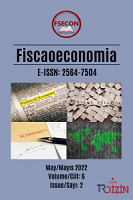Türkiye’de İş Arayan Bireylerin Kendi Hesabına Çalışma-Ücretli Çalışma Tercihinin Mikro Ekonomik Analizi
Micro-economic Analysis of Self-employment-Paid Employment Preferences of Job Seekers in Turkey
Author(s): Fatih Hakan Dikmen, Sıtkıcan SaraçoğluSubject(s): Micro-Economics, Regional Geography, Labor relations, Economic policy, Developing nations
Published by: Ahmet Arif Eren
Keywords: Self-Employment; Paid Employment; Job Seeking; Household Labor Survey; Logistic Regression;
Summary/Abstract: While the preferences of individuals in working life may be in the form of self-employment, it can also occur in the form of paid employment. Many developed and developing countries provide various incentives to support individual entrepreneurship. The aim of this study is to analyze the working preferences of unemployed individuals in Turkey. For this purpose, the Household Labor Force Survey (HLFS) micro data set, which was last conducted in 2020 by TURKSTAT, was used. In the estimation performed with the logistic regression method, the gender, the level of educational attainment, age, marital status, the type of residence and the region of residence of the individuals were taken as independent variables. Relating to the findings, males, individuals with higher levels of education, unmarried, residing in sub district or district center are more likely to be self-employed. Furthermore, as the age of individuals increases, the desire for entrepreneurship increases, while the possibility of self-employment decreases after a certain age. Finally, it has been observed that individuals living in Northeast Anatolia, Middle East Anatolia and Southeastern Anatolia Regions are more likely to be selfemployed than those living in other regions.
Journal: Fiscaoeconomia
- Issue Year: 6/2022
- Issue No: 2
- Page Range: 930-948
- Page Count: 19
- Language: Turkish

